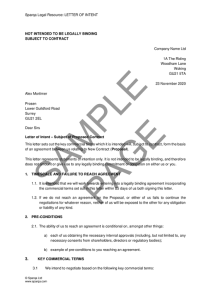 A letter of intent (also called heads of terms) is not generally legally binding unless you specify that it will be, or specify that certain terms will be legally binding. The purpose of the letter is to give both parties confidence that a deal is possible and that continuing negotiations is worth the time and expense that you will both spend. Our earlier blog in the Commercial series provides further guidance about what a letter of intent is.
A letter of intent (also called heads of terms) is not generally legally binding unless you specify that it will be, or specify that certain terms will be legally binding. The purpose of the letter is to give both parties confidence that a deal is possible and that continuing negotiations is worth the time and expense that you will both spend. Our earlier blog in the Commercial series provides further guidance about what a letter of intent is.
Despite not being legally binding, letters of intent are however considered to be ‘morally’ binding as they set out the parties’ intentions to reach a legally binding agreement and provide a focus for their discussions. Failing to stick to the agreed terms can end negotiations and undermine future relationships between the parties.
Bear in mind that even if your letter of intent is not legally binding, if English law applies to your negotiations then either party may be liable to the other for any loss incurred as a result of false statements or misrepresentations made during the course of those discussions.
Including legally binding terms in a letter of intent
Although letters of intent are not generally legally binding, you can include wording to make certain terms in your letter legally binding. Typically these will include confidentiality and exclusivity terms. Read this blog for further guidance about what terms to include in your letter of intent.
Before you disclose any information about your business during your negotiations, it’s also a good idea to ask the other party to sign a legally binding non-disclosure agreement (NDA) to protect your confidential information and intellectual property (IP) (see below).
Using a Non-Disclosure Agreement
During the course of commercial negotiations (eg if you will be entering into a business collaboration), it is inevitable that you will be disclosing information about your business. When doing so, it is imperative that you have sufficient safeguards in place to protect your confidential information and IP. If you don’t have the requisite safeguards in place, you’re more vulnerable to having your designs, work or inventions stolen or copied by the person you are dealing with, which could have disastrous effects on your business.
There are legal and practical steps that you can take to protect your confidential information and IP during negotiations with someone from outside your business, which include having a non-disclosure agreement (NDA) in place.
A properly drafted NDA, which is signed by the person you are meeting or negotiating with, will put that person under a legal obligation not to disclose any information referred to in the NDA. An NDA should be signed before you disclose any information, which will most typically be during the early stages of your negotiations on a particular idea, project or transaction. You can find further guidance about using NDAs in our Q&A on NDAs and protecting confidential information.
Use our template mutual NDA if you and the other party to the negotiations will both be agreeing to keep each other’s information confidential. If you want a one-way NDA instead (where most of the confidentiality restrictions are placed on the person you’re disclosing information to), you can use our template one-way NDA.
Other ways to protect your intellectual property during business negotiations
In addition to using a non-disclosure agreement, there are other steps you can take to protect your IP during business negotiations. These steps should be used together where possible, and include:
1. Registering your IP
You can register certain types of IP (eg trade marks and designs), depending on exactly what you are aiming to protect. For further guidance about registering your IP, see our Q&A on Intellectual property issues during meetings or negotiations.
2. Taking practical steps to reveal as little information about your confidential information and IP as possible
You should be wary of who you are talking to and only reveal information where it is necessary to do so. The more you reveal, the greater chance of the party you are talking to stealing your confidential information or intellectual property. You should be particularly wary of divulging too much information concerning any invention you might have. If you disclose what the invention is, you may lose your right to patent it in the future.
The content in this article is up to date at the date of publishing. The information provided is intended only for information purposes, and is not for the purpose of providing legal advice. Sparqa Legal’s Terms of Use apply.

Before joining Sparqa Legal as a Senior Legal Editor in 2017, Frankie spent five years training and practising as a corporate disputes and investigations lawyer at leading international law firm Hogan Lovells. As legal insights lead, Frankie regularly contributes to Sparqa Legal’s blog, writing content across employment law, data protection, disputes and more.






